A Petition for the Cotton Gin
Focusing on Details: Discussion Topic
All documents and text associated with this activity are printed below, followed by a worksheet for student responses.Introduction
The First Amendment of the U.S. Constitution protects the right of people to petition the Government to share their opinion and ask for a specific action to be taken. Eli Whitney filed this petition with Congress concerning his invention: the cotton gin. Read, summarize, and analyze this petition for understanding.Name:
Class:
Class:
Worksheet
A Petition for the Cotton Gin
Focusing on Details: Discussion Topic
Examine the documents included in this activity and write your response in the space provided.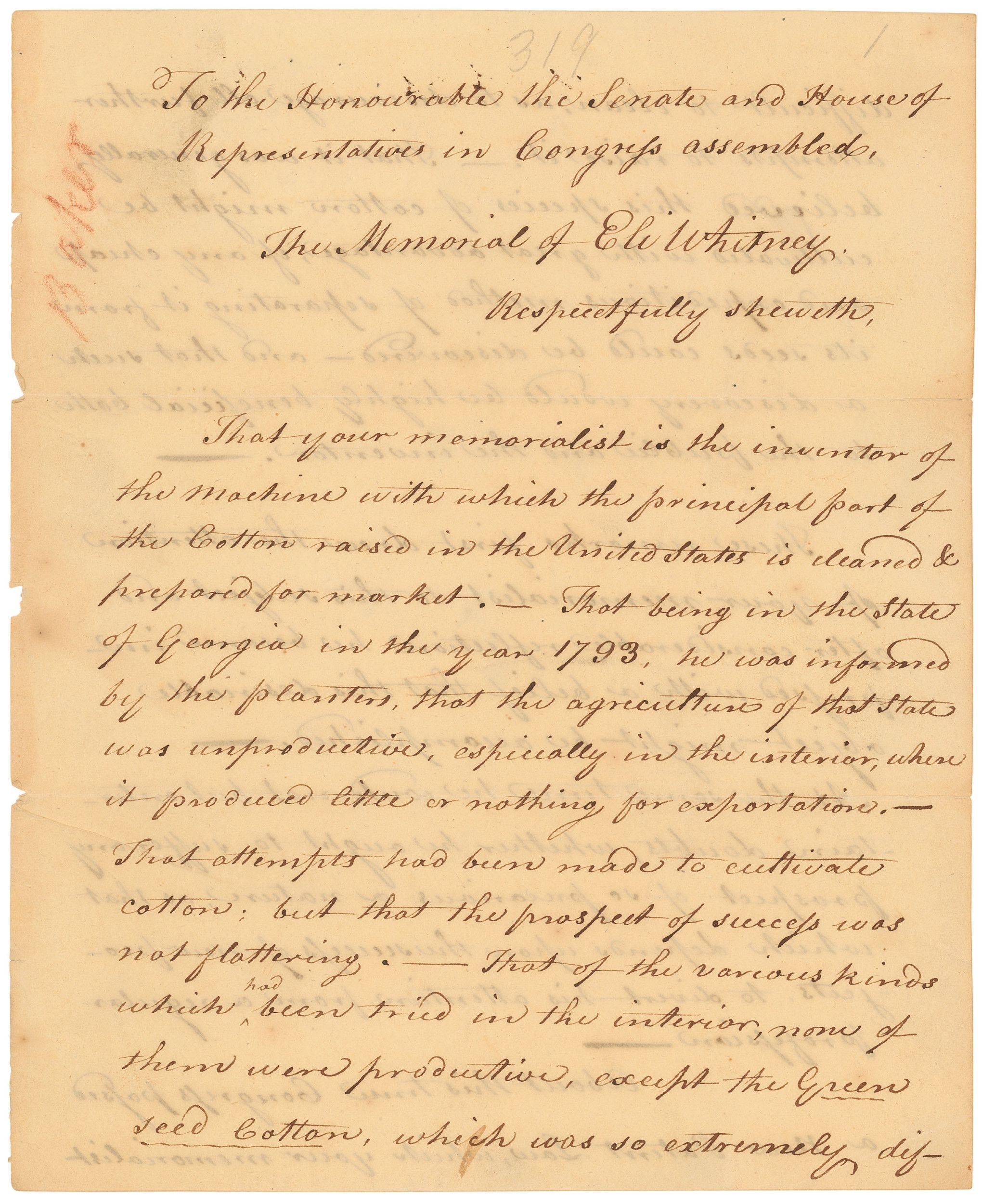
Carefully read and summarize the document. Cite specific textual evidence to support your analysis of the document. What was the Eli Whitney's purpose in writing this document? What are the central ideas of this document? What evidence does Eli Whitney provide to support his argument? How is the document organized? How does the Eli Whitney use the structure to support his argument?
Your Response
1
Activity Element
Petition of Eli Whitney requesting the renewal of his patent on the cotton gin

Conclusion
A Petition for the Cotton Gin
Focusing on Details: Discussion Topic
Imagine you were a member of Congress that received this petition from Eli Whitney. Would you have voted in favor of or against Eli Whitney's petition to renew his patent for the cotton gin? Why or why not? Cite specific evidence from his petition in your answer.Your Response
Document
Petition of Eli Whitney requesting the renewal of his patent on the cotton gin
4/16/1812
In 1792, Eli Whitney left his native Massachusetts to assume the position of private tutor on a plantation in Georgia. He quickly learned that, despite their use of enslaved labor, Southern agricultural leaders were unable to make cotton growing profitable. Long-staple cotton, which was easy to separate from its seeds, could be grown only along the coast. The one variety that grew inland had sticky green seeds that were time-consuming to pick out of the fluffy white cotton bolls. Tobacco was also declining in profit due to over-supply and soil exhaustion.
Whitney was encouraged to find a solution to this problem by his employer, Catherine Greene. He knew that if he could invent such a machine, he could apply to the federal government for a patent. If granted, he would have exclusive rights to his invention for 14 years, and he could hope to reap a considerable profit from it.
The Constitution empowers Congress "To promote the progress of science and useful arts by securing for limited times to authors and inventors the exclusive right to their respective writings and discoveries." The patent bill of 1790 enabled the government to patent "any useful art, manufacture, engine, machine, or device, or any instrument thereon not before known or used." The patent act of 1793 gave the secretary of state the power to issue a patent to anyone who presented working drawings, a written description, a model, and paid an application fee.
Whitney received a patent for his cotton gin in 1794 (his idea was based on earlier gins and also on ideas from other people, including enslaved laborers). A small gin could be hand-cranked; larger versions could be harnessed to a horse or driven by water power. "One man and a horse will do more than fifty men with the old machines," wrote Whitney to his father...."Tis generally said by those who know anything about it, that I shall make a Fortune by it."
After considering possible options, Whitney and his business partner, Phineas Miller, opted to produce as many gins as possible, install them throughout Georgia and the South, and charge plantations a fee for doing the ginning for them. Their charge was two-fifths of the profit – paid to them in cotton itself. But plantation owners resented having to go to Whitney's gins where they had to pay, what they regarded as, an exorbitant tax. Instead they began making their own versions of Whitney's gin and claiming they were "new" inventions. Miller brought costly suits against the owners of these pirated versions; but because of a loophole in the wording of the 1793 patent act, they were unable to win any suits until 1800, when the law was changed.
Struggling to make a profit and mired in legal battles, the partners finally agreed to license gins at a reasonable price. In 1802, South Carolina agreed to purchase Whitney's patent right for $50,000 but delayed in paying it. The partners also arranged to sell the patent rights to North Carolina and Tennessee. By the time even the Georgia courts recognized the wrongs done to Whitney, only one year of his patent remained. In 1808 and again in 1812 – the document seen here – he petitioned Congress for a renewal of his patent.
Whitney was encouraged to find a solution to this problem by his employer, Catherine Greene. He knew that if he could invent such a machine, he could apply to the federal government for a patent. If granted, he would have exclusive rights to his invention for 14 years, and he could hope to reap a considerable profit from it.
The Constitution empowers Congress "To promote the progress of science and useful arts by securing for limited times to authors and inventors the exclusive right to their respective writings and discoveries." The patent bill of 1790 enabled the government to patent "any useful art, manufacture, engine, machine, or device, or any instrument thereon not before known or used." The patent act of 1793 gave the secretary of state the power to issue a patent to anyone who presented working drawings, a written description, a model, and paid an application fee.
Whitney received a patent for his cotton gin in 1794 (his idea was based on earlier gins and also on ideas from other people, including enslaved laborers). A small gin could be hand-cranked; larger versions could be harnessed to a horse or driven by water power. "One man and a horse will do more than fifty men with the old machines," wrote Whitney to his father...."Tis generally said by those who know anything about it, that I shall make a Fortune by it."
After considering possible options, Whitney and his business partner, Phineas Miller, opted to produce as many gins as possible, install them throughout Georgia and the South, and charge plantations a fee for doing the ginning for them. Their charge was two-fifths of the profit – paid to them in cotton itself. But plantation owners resented having to go to Whitney's gins where they had to pay, what they regarded as, an exorbitant tax. Instead they began making their own versions of Whitney's gin and claiming they were "new" inventions. Miller brought costly suits against the owners of these pirated versions; but because of a loophole in the wording of the 1793 patent act, they were unable to win any suits until 1800, when the law was changed.
Struggling to make a profit and mired in legal battles, the partners finally agreed to license gins at a reasonable price. In 1802, South Carolina agreed to purchase Whitney's patent right for $50,000 but delayed in paying it. The partners also arranged to sell the patent rights to North Carolina and Tennessee. By the time even the Georgia courts recognized the wrongs done to Whitney, only one year of his patent remained. In 1808 and again in 1812 – the document seen here – he petitioned Congress for a renewal of his patent.
Transcript
To the Honourable the Senate and House of Representatives in Congress assembled.The Memorial of Eli Whitney.
Respectfully sheweth,
That your memorialist is the inventor of the machine with which the principal part of the Cotton raised in the United States is cleaned & prepared for market.– That being in the State of Georgia in the year 1793, he was informed by the planters, that the agriculture of that state was unproductive, especially in the interior, where it produced little or nothing for exportation.– That attempts had been made to cultivate cotton; but that the prospect of success was not flattering.– That of the various kinds which ^had^ been tried in the interior, none of them were productive, except the [underline] Green Seed Cotton, [end underline] which was so extremely dif-
difficult to clean, as to discourage all further attempts to raise it.– That it was generally believed this species of cotton might be cultivated with great advantage, if any cheap and expeditious method of separating it from its seeds could be discovered – and that such a discovery would be highly beneficial both to the public and the inventor.–
These remarks first drew the attention of your memorialist to this subject and after considerable reflection he became impressed with a belief that this desireable object might be accomplished.– At the same time he could not but entertain doubts, whether he ought to suffer any prospect of so precarious a nature, as that which depends upon the success of new projects, to divert his attention from a regular profession–
About this time Congress passed a new Patent Law, which your memorialist
considered as a premium offered to any citizen who should devote his attention to useful improvements and as a pledge from his country, that in case he should be successful, his rights and his property would be protected.–
Under these impressions your memorialist relinquished every other object of pursuit and devoted his utmost exersions to reduce his invention, which, as yet was little more than a floating image of the mind, to practical use – and fortunately for the Country he succeeded in giving [underline] form [end underline] to the conceptions of his imagination and to [underline] matter [end underline] a [underline] new mode of existence, [end underline] and the [underline] result [end underline] of this [underline] new modification of matter, [end underline] was every thing that could be wished–
After reducing his theory to practice by effectual & successful experiments your memorialist took out a Patent.—
– So alluring were the advantages developed by this invention that in a short time the whole attention of the planters of the middle and upper country, of the Southern states, was turned to planting the Green Seed Cotton– The means furnished by this discovery of cleaning that species of cotton, were at once so cheap and expeditious, and the prospect of advantage so alluring, that it suddenly became the general crop of the country–
Little or no regard, however, was paid to the claims of your memorialist– and the infringement of his rights became almost as extensive as the cultivation of cotton– He was soon reduced to the disagreeable necessity of resorting to courts of Justice for the protection of his property–
After the unavoidable delays which usually attend prosecutions of this kind
[facing page]
and a laboured trial, it was discovered that the Defendents had only [underline] used [end underline] – and that as the law then stood they must both [underline] make and use [end underline] the machine, or they could not be liable– the Court decided that it was a fatal, though inadvertent defect in the law and gave judgment for the Defendents.–
It was not untill the year 1800, that this defect in the law was amended.– Immediately after the amendment of the law, your memorialist commenced a number of suits; but so effectual were the means of procrastination and delay, resorted to, by the Defendents, that he was unable to obtain any decision on the merits of his claim until the year 1807– not untill he had been [underline] eleven years [end underline] in the Law & [underline] thirteen Years [end underline] of his patent term had expired.–
A compromise has been made with several of the States, to which your memorialist has assigned his right and relinquished all further claim; but from the state in
which he first made and introduced his invention, and which has derived the most signal benefits from it, he has realized nothing– and from no state has he received the amount of half a Cent per pound, on the cotton cleaned with his machine, within that state in one year.–
Estimating the value of the labour of one man at twenty cents per Day, the [underline] whole amount [end underline] which has been realized by your memorialist for his invention, is not equal to the value of the labour saved in[underline] one hour [end underline] by his machines, [underline] now in use, [end underline] in the U States.–
Permit your memorialist further to remark that by far the greatest part of the cotton raised in the United States has been & must of necessity continue to be in the [underline] Green Seed. [end underline]– That, before the inventions of your memorialist, the value of this species of cotton, after it was cleaned, was not equal to the expence of cleaning it– that since; the cultivation of this species has been a great
source of wealth to the community & of riches to thousands of her citizens– that as a labour-saving machine it is an invention which enables [underline] one man [end underline] to perform in a given time [underline] that [end underline] which would require a [underline] thousand men [end underline] without its aid, to perform in the same time.– in short that it furnishes to the whole family of mankind the means of procuring the article of cotton, that important raw material, which constitutes a great part of their closthing at a much cheaper rate–
Your memorialist begs leave further to state that a confident expectation that his case would be embraced in the general law which Congress has, for several years had under consideration, has prevented his making an earlier application.– That the expenses incured by him in making and introducing this useful improvement and establishing his claim to its invention, have absorbed a great proportion of what he has received, from those states with which he has made a compromise–
That he humbly conceives himself fairly intitled to a further remuneration from his Country,– and that he ought to be admitted to a more liberal participation with his fellow citizens, in the benefits of his invention–
He therefore prays your Honourable Body, to take his case into consideration and authorize the renewal of his Patent,– or grant such other relief, as Congress in their wisdom and their justice may deem meets and prosper–
Eli Whitney
Washington 16th. Aprl. 1812.
[bottom third of page written vertically]
No. 319
Petition of Eli Whitney
[line]
20th. Aprl. 1812. presented.
[line]
22d. Aprl. 1812.
Refd to Mr. Lowndes
Mr. Pitken
Mr. Hall of Georgia
Mr. Nelson, and
Mr. Gray.
[line]
Bill presented
[line]
Series 10
[illegible] Cong
[illegible] File
Miscellaneous
Vol II: page 183 – No. 319–
12th Congress
1 ref to 5
This primary source comes from the Records of the U.S. House of Representatives.
National Archives Identifier: 306631
Full Citation: Petition of Eli Whitney requesting the renewal of his patent on the cotton gin; 4/16/1812; Petitions Referred to the the Select Committee on the Renewal of Eli Whitney's Patent on the Cotton Gin; Records of Early Select Committees, 1793 - 1909; Records of the U.S. House of Representatives, ; National Archives Building, Washington, DC. [Online Version, https://docsteach.org/documents/document/patent-renewal-cotton-gin, April 25, 2024]Petition of Eli Whitney requesting the renewal of his patent on the cotton gin
Page 1
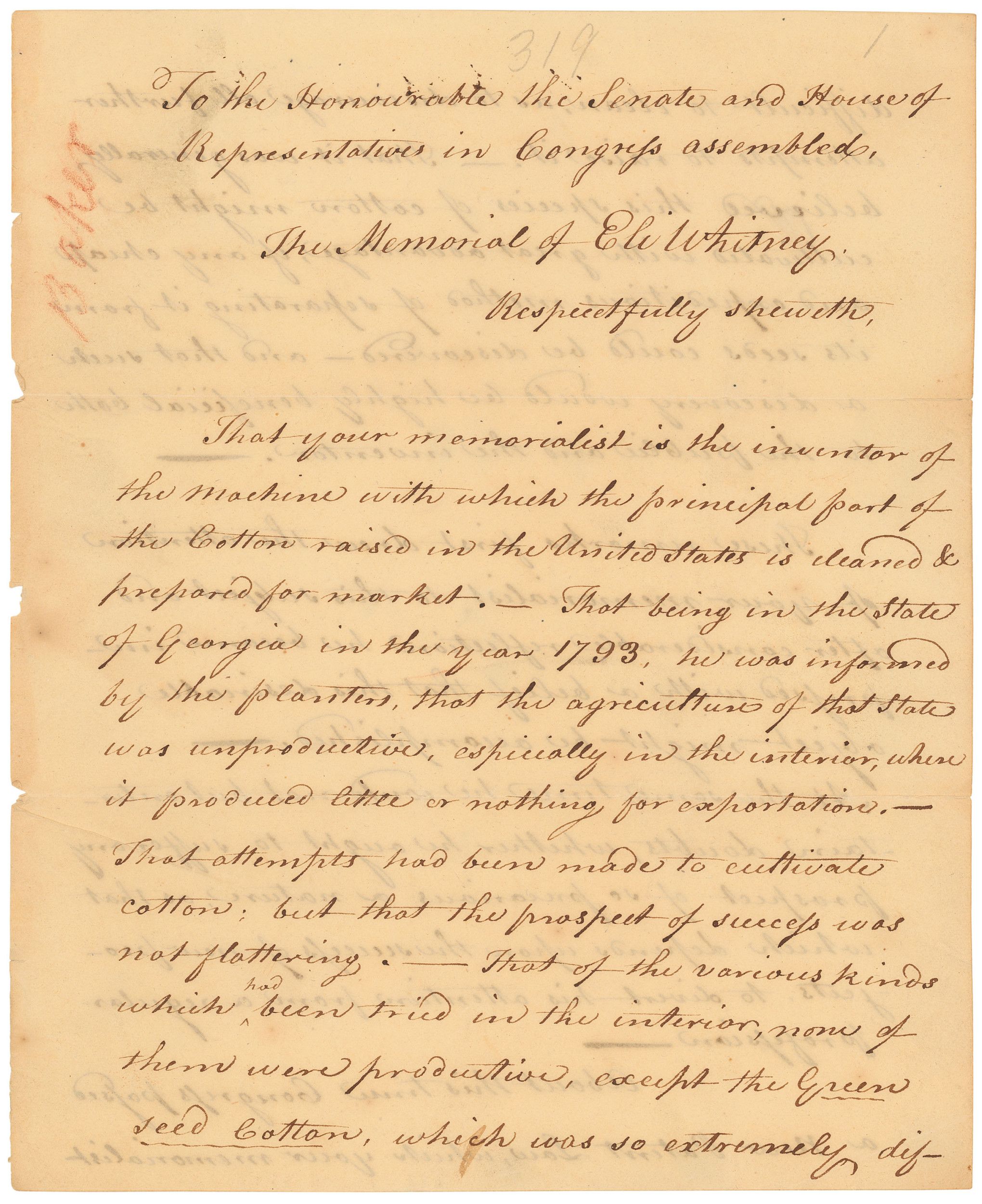
Petition of Eli Whitney requesting the renewal of his patent on the cotton gin
Page 2
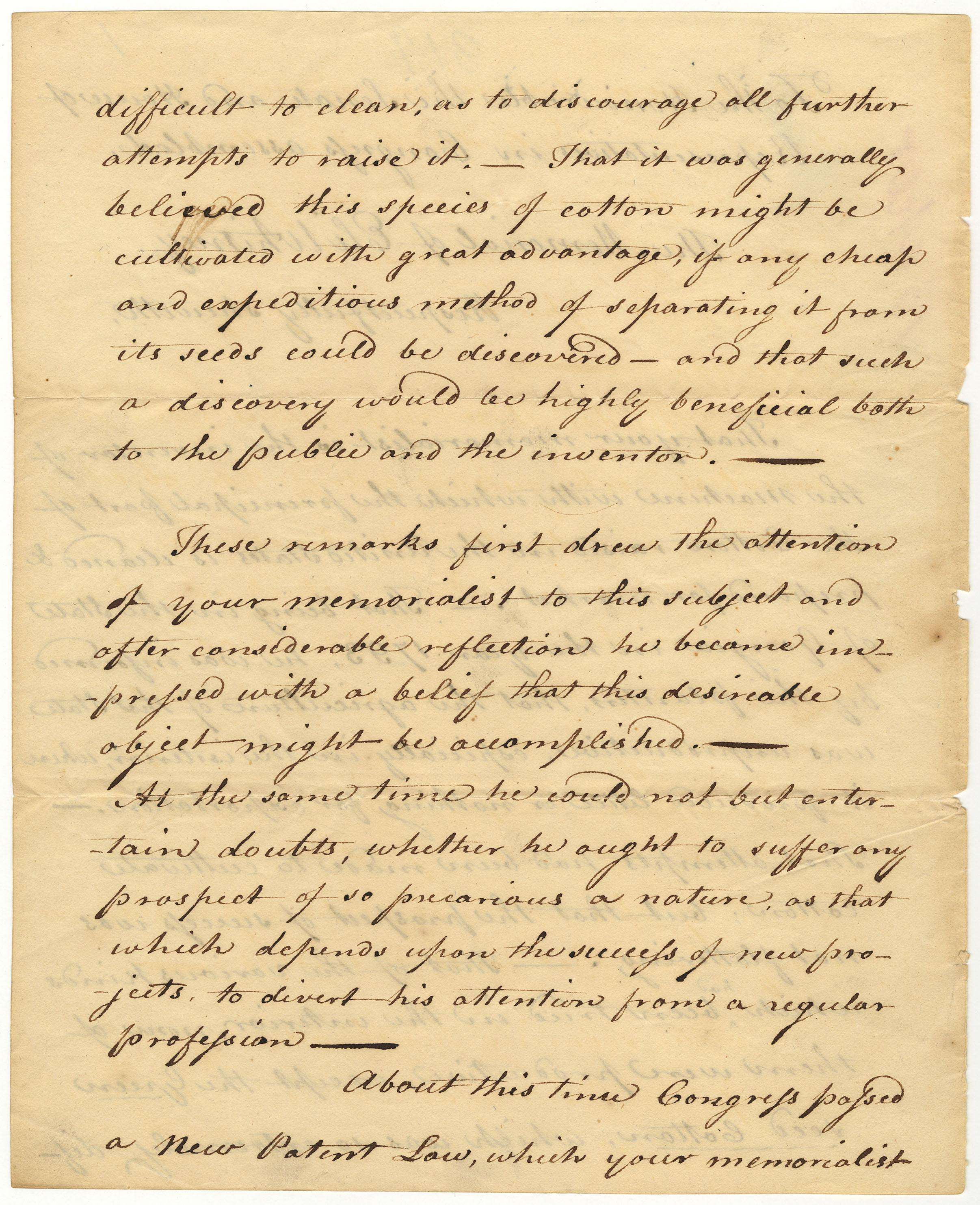
Petition of Eli Whitney requesting the renewal of his patent on the cotton gin
Page 3
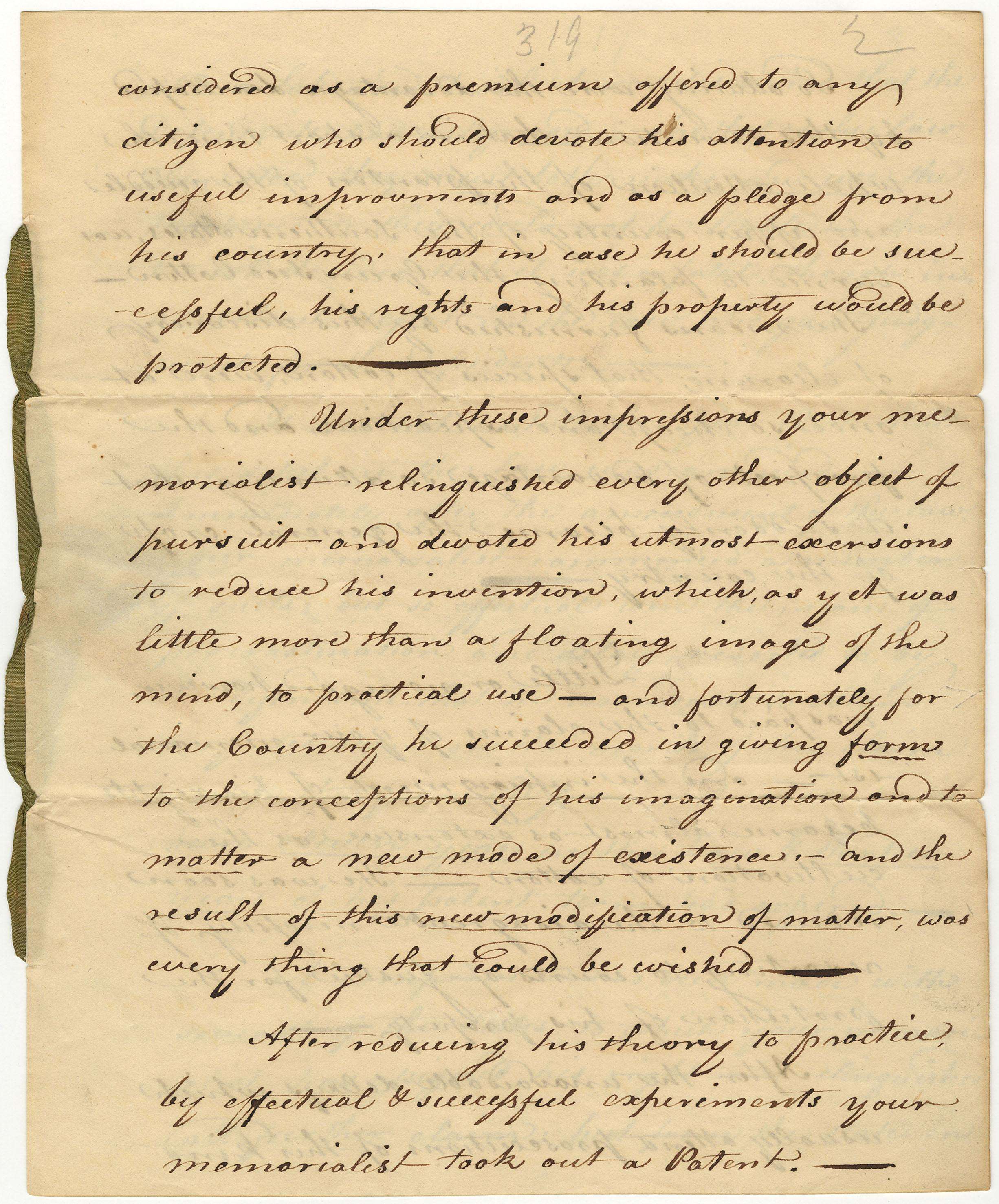
Petition of Eli Whitney requesting the renewal of his patent on the cotton gin
Page 4
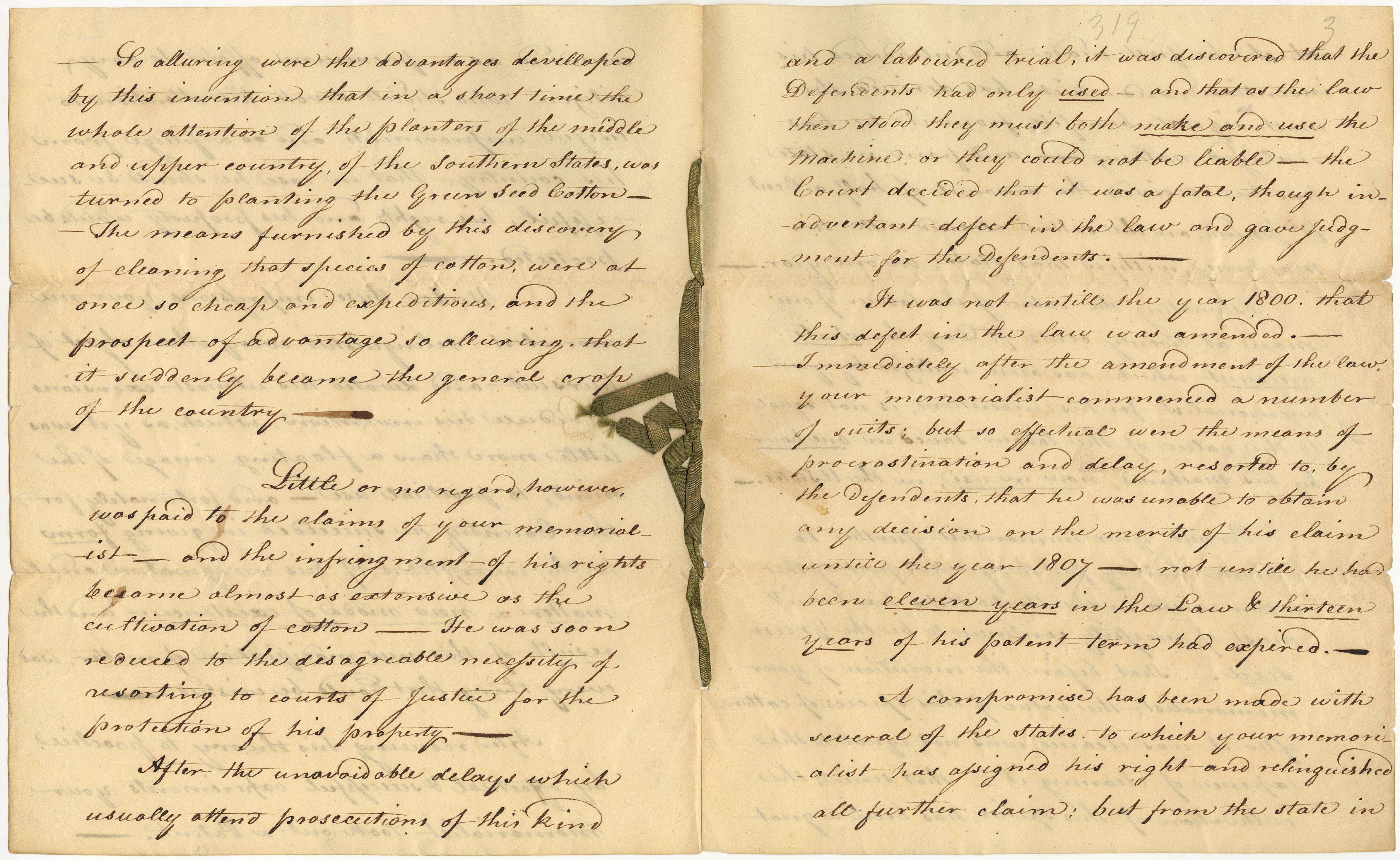
Petition of Eli Whitney requesting the renewal of his patent on the cotton gin
Page 6
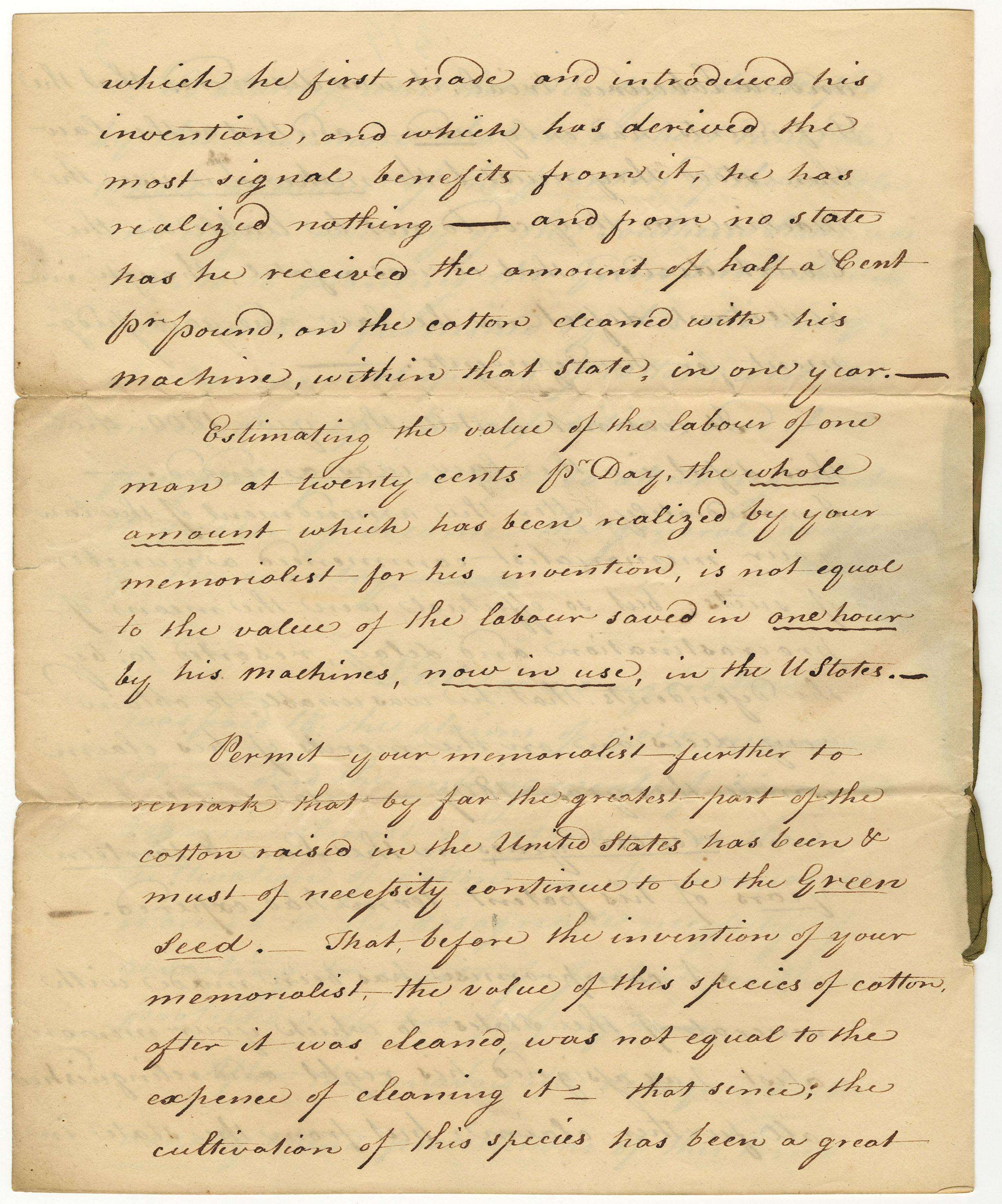
Petition of Eli Whitney requesting the renewal of his patent on the cotton gin
Page 7
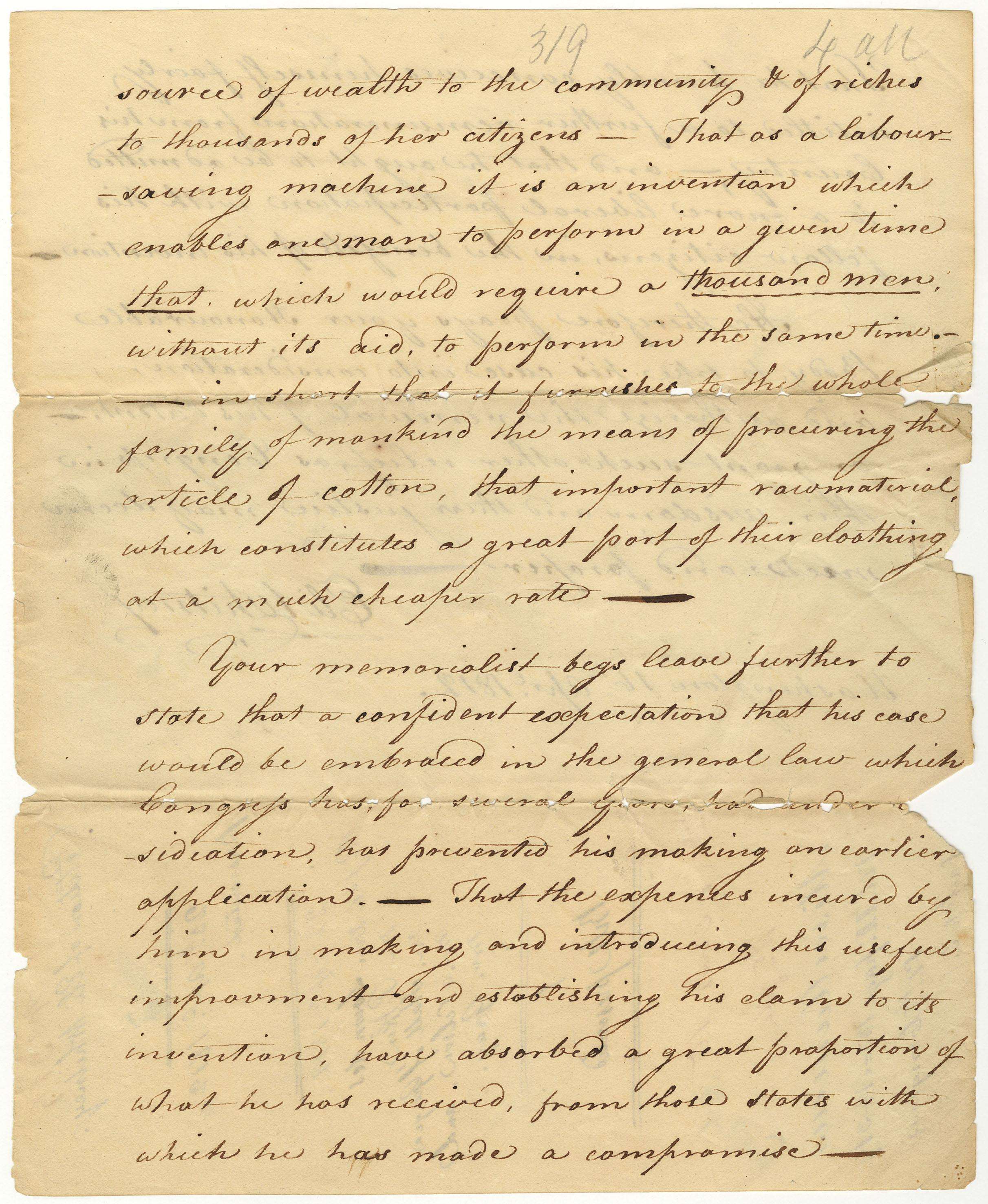
Petition of Eli Whitney requesting the renewal of his patent on the cotton gin
Page 8

